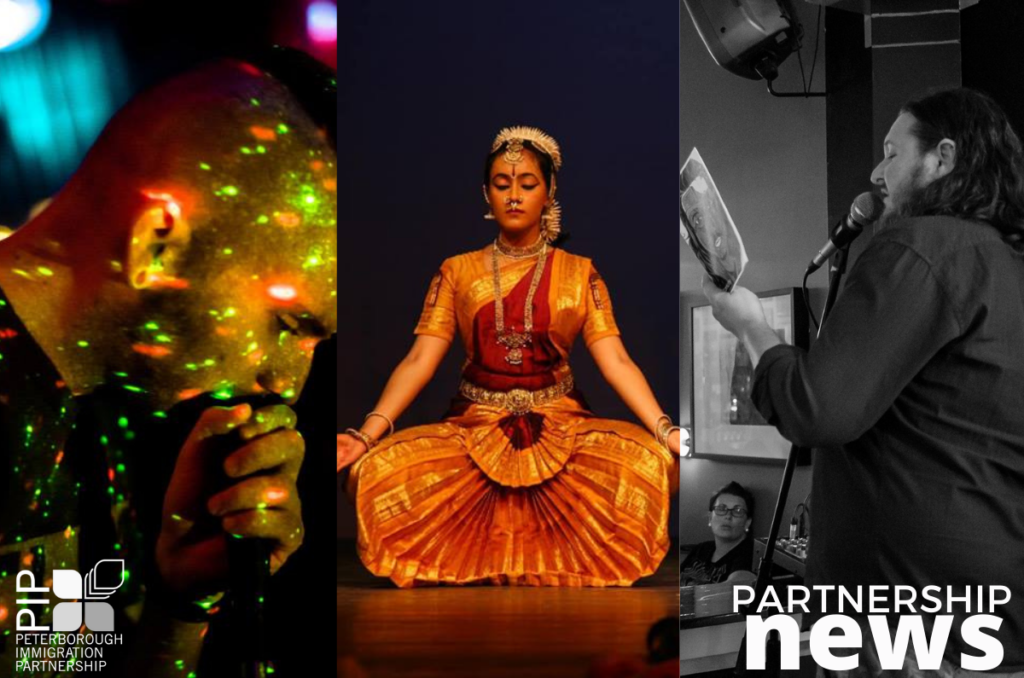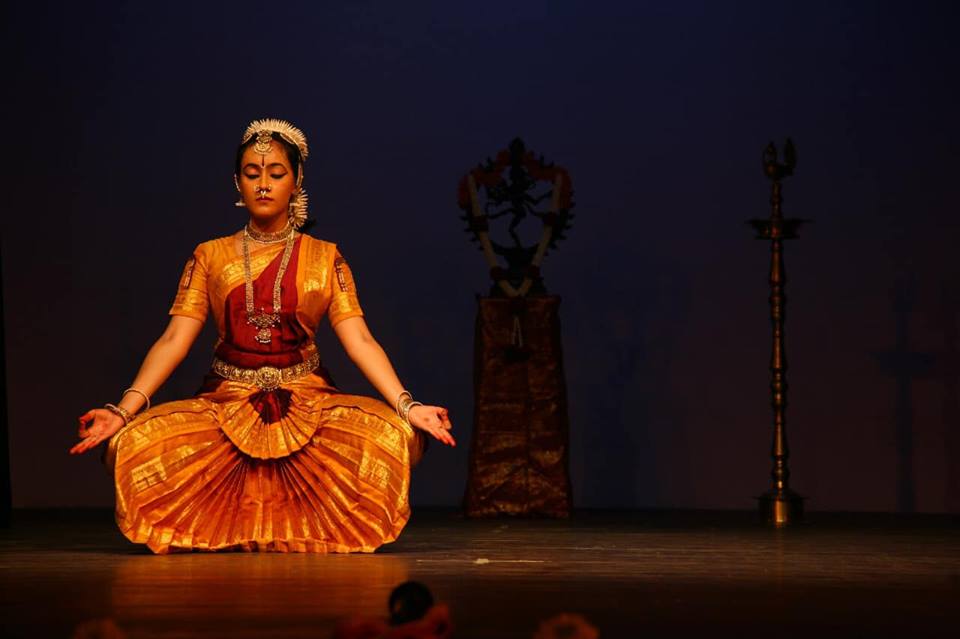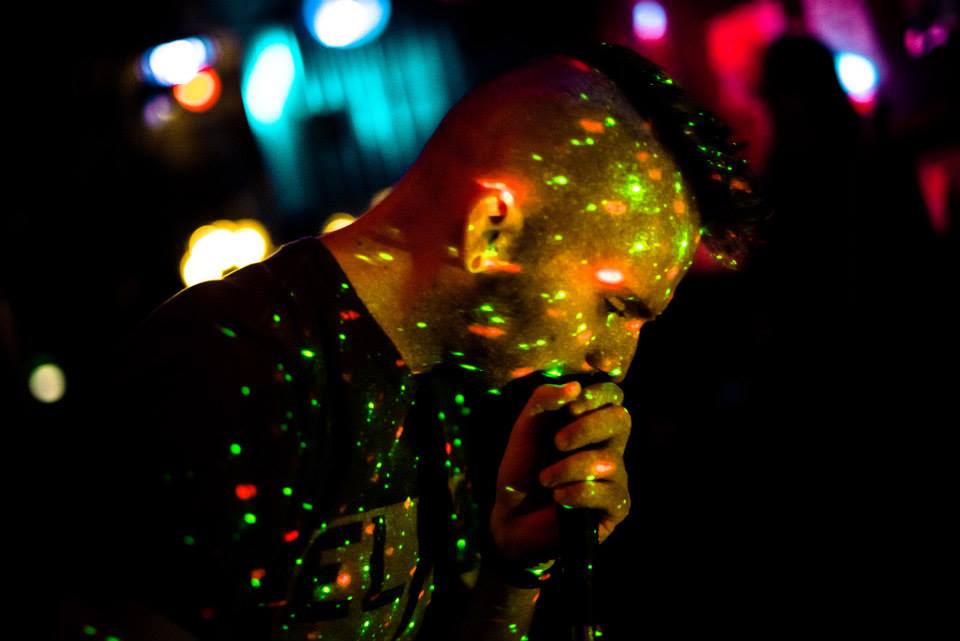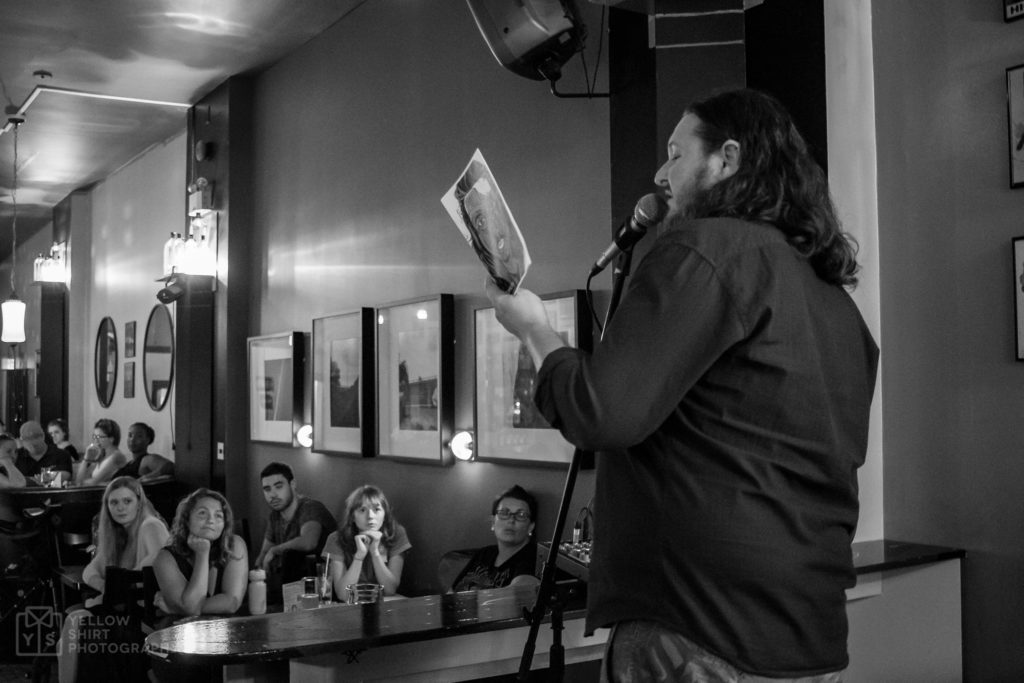Migration Stories to be featured at Precarious Festival

April 2021 Edition of Partnership News by the Peterborough Immigration Partnership
Guest Post by: Kate Story
The local Precarious Festival was born in 2017. The multi-artist weeks-long events have arguably become one of Peterborough’s most vital forums for artist-driven investigations of precarity. A partnership-driven approach with non-arts groups helps bring work to new audiences and provides multiple co-creative connections.
As a response to pandemic pressures, Precarious3 is centred around nine Precarity Residencies at The Theatre on King. It was going to launch this month, but the lockdown has created a pause. Activities will be shared online, in-person where possible, and featured on the festival website at ttok.ca
Four residencies touch on migration stories. Festival artistic director Kate Story spoke with three of the artists about how their stories feed into their artistic work, and got wildly varying answers! Stay tuned for the revised schedule, coming soon, and go to the TTOK website to read the full-length interviews with these wonderful artists.
Mithila Ballal has been training in Bharathanatyam since the age of 4, performing across India, USA and Canada. This award-winning dancer’s passion for dance led her to pursue her Masters in Dance/Movement Therapy and Mental Health Counselling at Lesley University, Cambridge, USA.
How does your migration story feed into your artistic practice?
Moving to Peterborough, I was the only Bharatanatyam dancer! I sought out others in Toronto. But I also found that there were other immigrants in Peterborough who wanted to learn this art form. I feel grateful and privileged that I was the only one who could pass this on to kids who were immigrants as well.
Also, I found that Bharatanatyam is so structured. My body has started to want to move in another way.
Do you think you would have discovered this about yourself if you had stayed in India?
They have contemporary dance in India, but moving here, I started feeling that there were other ways of moving as well.
What are your thoughts about the work you want to create during your Precarious3 residency?
I have a strong feeling it won’t be Bharatanatyam only – maybe not at all. I will see what comes up. Often, Bharatanatyam portrays Hindu mythology; personally, I have never used it to explore themes such as womanhood, or grief. So, it will be interesting to see what will happen. I want to move forward with my artistic practice. The grief I am exploring and expressing stems from the loss of a family member. The grief of not being able to go home. The grief of not being able to have that closure.
garbageface (aka karol orzechowski) has an impressive body of work including musical releases, writing, installations, and community-building activities.
How does your migration story feed into your artistic practice?
As far as considering myself a newcomer… I don’t think I do! I was born in Poland, moved here at 14 months. I’ve had all of the privilege of a born-in-Canada white Canadian man.
Being a child of immigrants, I saw my parent struggle. A very typical immigrant story: they came from relatively skilled jobs in their home country to unskilled labour here, to give their kids a break.
The family organized a trip back to Poland a few years ago for all of us. I thought, wow, this is a really white country, but also, these people really look like me.
You recently released a new music/T-shirt project with Bennett Bedoukian/Cold Eye X “Behind Each Gate: a Serpent.” You said on social media that it features symbols of protection.
Yes, symbols from Polish heraldry, and the Polish occult. One church we visited in Poland, built in the tenth century, featured a giant Zodiac wheel.
Did you have a sense of difference growing up? Was that an engine for your becoming an artist?
I had a sense of difference, but it wasn’t related to being an immigrant, it had more to do with class. My parents were working class – my friends growing up were considerably wealthier than I was in a really obvious way.
Every place has some sense of insider/outsider dynamics – it is stronger in some places than others. When I was starting to develop as an artist in high school, the hard insider/outsider thing was sports versus arts. St. Pete’s was a huge sports school. I gravitated toward arts and tech.
How does your family feel about your work as an artist?
My parents are mystified. What I do is unrecognizable as music to them. But part of having this immigrant experience is that they really didn’t see art as a viable career. They are happy for me that I do it, but they often ask, “Oh, are you still going around and playing shows?”
I think one of the hardest things for my parents is watching me struggle – even though those have been some of the happiest times in my life. They instilled in me that they wanted me to have a happy life. But to them, a happy life was having a good job and a better home. I think they were hoping I’d end up in law, rather than being an artist.
Jon Hedderwick is a spoken word poet, storyteller, mixed-media producer, organizer and educator of mixed Ashkenazi Jewish and Scottish heritage. Hedderwick performs, organizes, and mentors emerging poets as the current Artistic Director for the Peterborough Poetry Slam Collective.
Your family migration story is the inspiration for your work during your Precarious3 residency.
Yes. My great grandmother – my Bubby Sarah – was diagnosed with Alzheimer’s when I was in grade 7 or 8. I was helping my mother clean out her apartment when I found a cassette tape. I took it, thinking I would make a mix tape (that dates me!). When I put it in the recorder, I thought, I’d better see if this is really a blank tape. I pressed play, and I heard her voice, an early memory: a soldier harassing women in a marketplace in a Polish town and swindling them out of their money. They tried to detain him, he ran away, and the police shot him.
I told my mom about it – and she immediately took the tape away. I think she knew what was going to come next and felt I was too young for those stories.
What was the part of the story that your mother thought you were too young to hear about?
The police officer who shot the man must have been Jewish, or perhaps it was that the women who complained were, I guess it could have even been the soldier, it’s unclear, but the other townspeople went into the church and began to organize a pogrom – an ethnic cleansing; they were going to kill all the Jews. After narrowly avoiding this, the tape goes on to tell the story of Bubby Sarah’s migration – moving here to Canada.
Bubby Sarah was a kid at the time. She had spent World War I in hiding in rural Poland at her grandparents’ farm. Her father made it out to Canada and served in the Canadian military so that he could raise the money to get the family over, but couldn’t get them out until after. What isn’t on the tapes is that any family members who didn’t make it to Canada died in concentration camps in the next war.
What draws you to look at this story from your family’s past?
Something my friend Ziy says all the time is that learning about Indigenous culture as part of decolonization work has made them a better Jew. To be in this place, I have to understand the story that brought me here. I am a person who is part of a diaspora that went through generation after generation of genocide. I have privilege due to my whiteness that also exists alongside antisemitism and real intergenerational traumas.
As Jewish people and as descendants of Jewish people, we have a responsibility in the face of oppression: solidarity with other oppressed people. One of the few things I remember Bubby saying is, “You’re going to be a big doctor, a big lawyer. That will protect you.” She saw economic advantage as protection. That’s a failure in the belief in solidarity. But how do you believe in solidarity when your neighbours are coming to kill you?
Do you think this fragmented family story has affected your sense of identity growing up in Canada?
It has. On the one hand, being Jewish has made me different in ways that have sometimes been dangerous, on the other hand, I’m mixed, white and my family is largely assimilated; we enjoy a great deal of settler privilege. I’m interested in that tension of being a settler descended from refugees – we came here by choice, but we had nowhere else to be. We assimilated, but assimilation was in part a survival strategy. We often identify with the struggles of indigenous people, but many of our people embrace capitalism and even participate in white supremacy. The more I look at this, the more I realize I can’t understand my relation to this place without examining the circumstances that brought me here.
Established in 2008, the Peterborough Immigration Partnership (PIP) is a community-based partnership of individuals & organisations (including the NCC) which envisions a community where the meaningful economic, social and cultural integration of newcomers ensures a prosperous and inclusive community for all.
Please contact us for more information and to become involved in this partnership.



